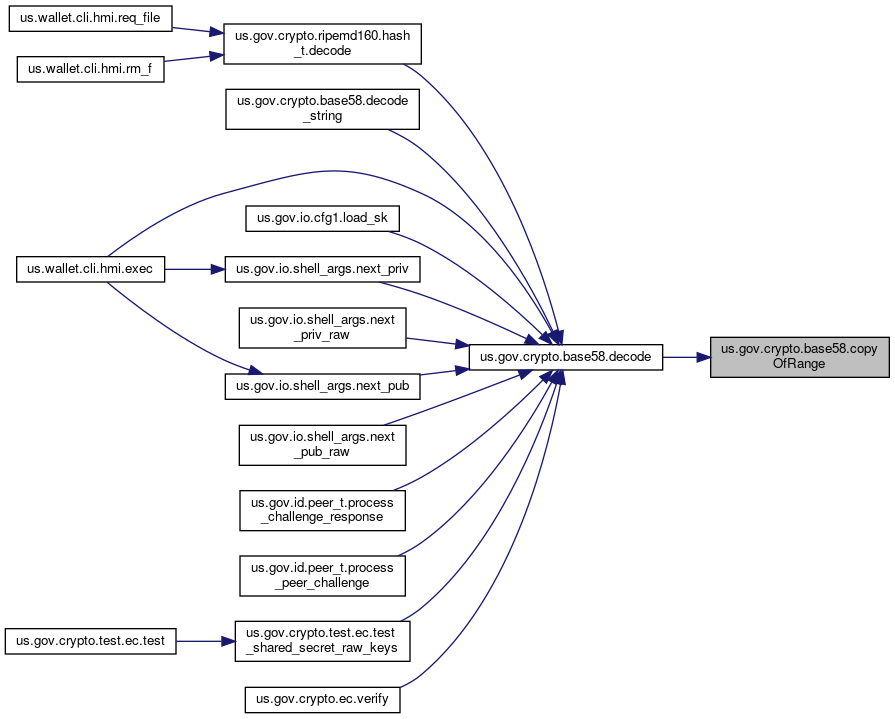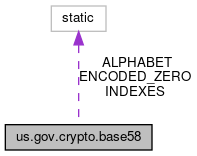
Classes | |
| class | AddressFormatException |
Static Public Member Functions | |
| static String | encode (byte[] input_) |
| static byte[] | copyOfRange (byte[] src, int start, int end) |
| static byte[] | decode (String input) |
| static String | encode (byte[] input) |
| static String | decode_string (String input) |
| static byte[] | decode (String input) throws AddressFormatException |
Static Public Attributes | |
| static readonly char[] | ALPHABET = "123456789ABCDEFGHJKLMNPQRSTUVWXYZabcdefghijkmnopqrstuvwxyz".ToCharArray() |
| static final char[] | ALPHABET = "123456789ABCDEFGHJKLMNPQRSTUVWXYZabcdefghijkmnopqrstuvwxyz".toCharArray() |
Static Package Functions | |
| [static initializer] | |
Static Private Member Functions | |
| static | base58 () |
| static byte | divmod (byte[] number, int firstDigit, int based, int divisor) |
| static byte | divmod (byte[] number, int firstDigit, int base, int divisor) |
Static Private Attributes | |
| static readonly char | ENCODED_ZERO = ALPHABET[0] |
| static readonly int[] | INDEXES = new int[128] |
| static final char | ENCODED_ZERO = ALPHABET[0] |
| static final int[] | INDEXES = new int[128] |
Detailed Description
Base58 is a way to encode Bitcoin addresses (or arbitrary data) as alphanumeric strings.
Note that this is not the same base58 as used by Flickr, which you may find referenced around the Internet.
You may want to consider working with PrefixedChecksummedBytes instead, which adds support for testing the prefix and suffix bytes commonly found in addresses.
Satoshi explains: why base-58 instead of standard base-64 encoding?
- Don't want 0OIl characters that look the same in some fonts and could be used to create visually identical looking account numbers.
- A string with non-alphanumeric characters is not as easily accepted as an account number.
- E-mail usually won't line-break if there's no punctuation to break at.
- Doubleclicking selects the whole number as one word if it's all alphanumeric.
However, note that the encoding/decoding runs in O(n²) time, so it is not useful for large data.
The basic idea of the encoding is to treat the data bytes as a large number represented using base-256 digits, convert the number to be represented using base-58 digits, preserve the exact number of leading zeros (which are otherwise lost during the mathematical operations on the numbers), and finally represent the resulting base-58 digits as alphanumeric ASCII characters.
Constructor & Destructor Documentation
◆ base58()
|
inlinestaticprivate |
References us.gov.crypto.base58.ALPHABET, and us.gov.crypto.base58.INDEXES.
Member Function Documentation
◆ [static initializer]()
|
inlinestaticpackage |
◆ copyOfRange()
|
inlinestatic |
◆ decode() [1/2]
|
inlinestatic |
Decodes the given base58 string into the original data bytes.
- Parameters
-
input the base58-encoded string to decode
- Returns
- the decoded data bytes
- Exceptions
-
AddressFormatException if the given string is not a valid base58 string
References us.gov.crypto.base58.copyOfRange(), us.gov.crypto.base58.divmod(), and us.gov.crypto.base58.INDEXES.
Referenced by us.gov.crypto.ripemd160.hash_t.decode(), us.gov.crypto.base58.decode_string(), us.wallet.cli.hmi.exec(), us::gov::io::cfg1.load_sk(), us::gov::io::shell_args.next_priv(), us::gov::io::shell_args.next_priv_raw(), us::gov::io::shell_args.next_pub(), us::gov::io::shell_args.next_pub_raw(), us::gov::id::peer_t.process_challenge_response(), us::gov::id::peer_t.process_peer_challenge(), us.gov.crypto.test.ec.test_shared_secret_raw_keys(), and us::gov::crypto::ec.verify().

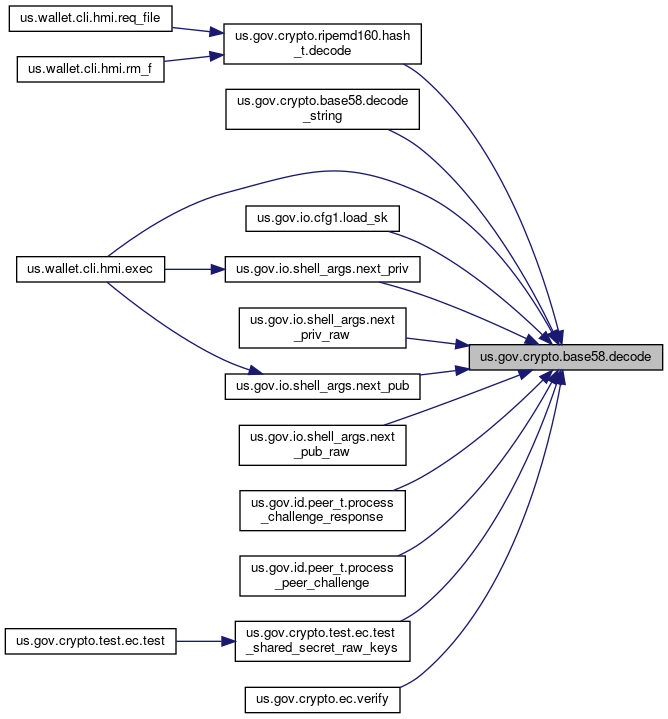
◆ decode() [2/2]
|
inlinestatic |
Decodes the given base58 string into the original data bytes.
- Parameters
-
input the base58-encoded string to decode
- Returns
- the decoded data bytes
- Exceptions
-
AddressFormatException if the given string is not a valid base58 string
References us.gov.crypto.base58.divmod(), and us.gov.crypto.base58.INDEXES.

◆ decode_string()
|
inlinestatic |
◆ divmod() [1/2]
|
inlinestaticprivate |
Divides a number, represented as an array of bytes each containing a single digit in the specified base, by the given divisor. The given number is modified in-place to contain the quotient, and the return value is the remainder.
- Parameters
-
number the number to divide firstDigit the index within the array of the first non-zero digit (this is used for optimization by skipping the leading zeros) base the base in which the number's digits are represented (up to 256) divisor the number to divide by (up to 256)
- Returns
- the remainder of the division operation
◆ divmod() [2/2]
|
inlinestaticprivate |
Divides a number, represented as an array of bytes each containing a single digit in the specified base, by the given divisor. The given number is modified in-place to contain the quotient, and the return value is the remainder.
- Parameters
-
number the number to divide firstDigit the index within the array of the first non-zero digit (this is used for optimization by skipping the leading zeros) base the base in which the number's digits are represented (up to 256) divisor the number to divide by (up to 256)
- Returns
- the remainder of the division operation
Referenced by us.gov.crypto.base58.decode(), and us.gov.crypto.base58.encode().
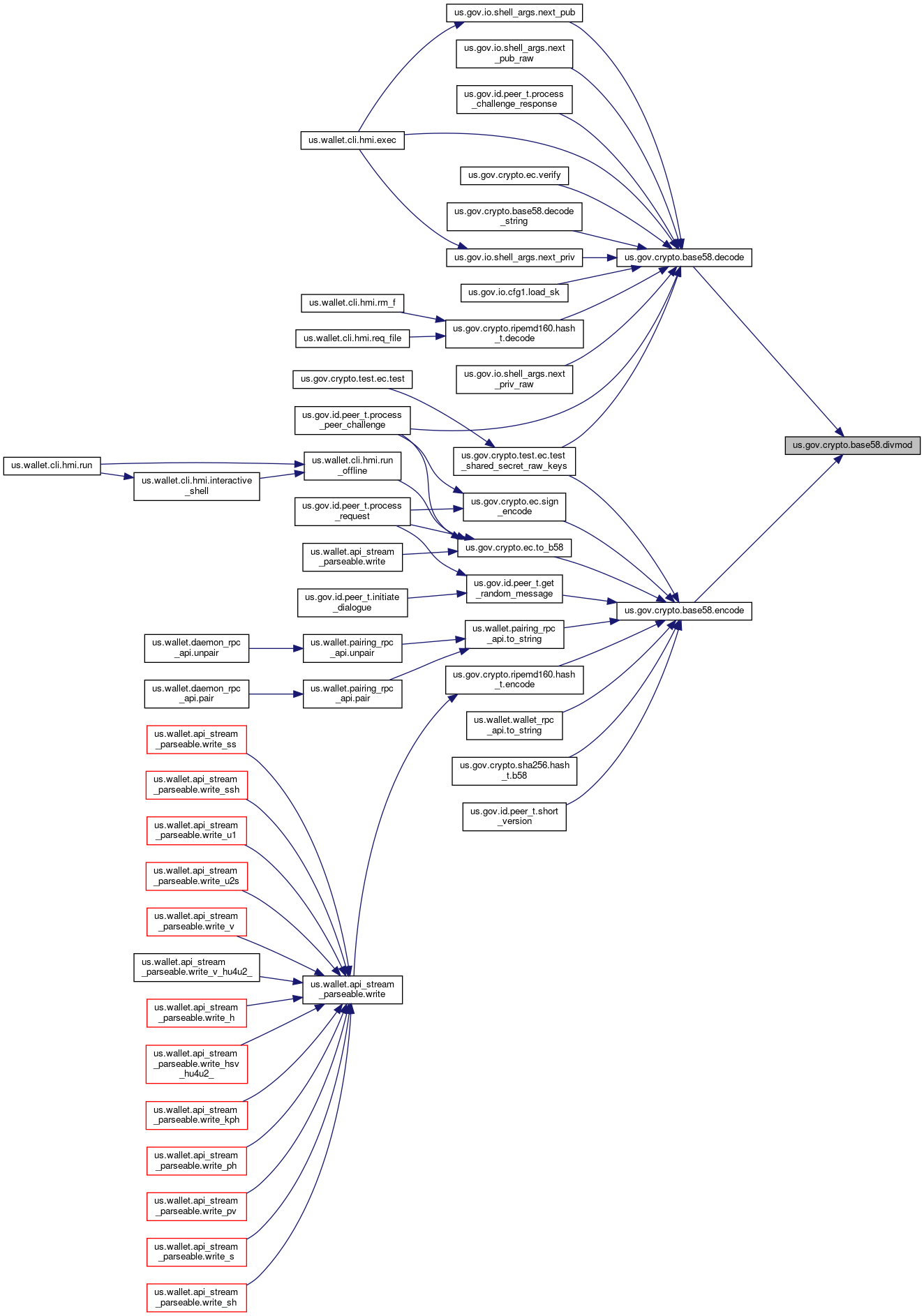
◆ encode() [1/2]
|
inlinestatic |
Encodes the given bytes as a base58 string (no checksum is appended).
- Parameters
-
input the bytes to encode
- Returns
- the base58-encoded string
References us.gov.crypto.base58.ALPHABET, us.gov.crypto.base58.divmod(), and us.gov.crypto.base58.ENCODED_ZERO.

◆ encode() [2/2]
|
inlinestatic |
Encodes the given bytes as a base58 string (no checksum is appended).
- Parameters
-
input the bytes to encode
- Returns
- the base58-encoded string
References us.gov.crypto.base58.ALPHABET, us.gov.crypto.base58.divmod(), and us.gov.crypto.base58.ENCODED_ZERO.
Referenced by us.gov.crypto.sha256.hash_t.b58(), us.gov.crypto.ripemd160.hash_t.encode(), us::gov::id::peer_t.get_random_message(), us::gov::id::peer_t.short_version(), us::gov::crypto::ec.sign_encode(), us.gov.crypto.test.ec.test_shared_secret_raw_keys(), us::gov::crypto::ec.to_b58(), us.wallet.pairing_rpc_api.to_string(), and us.wallet.wallet_rpc_api.to_string().

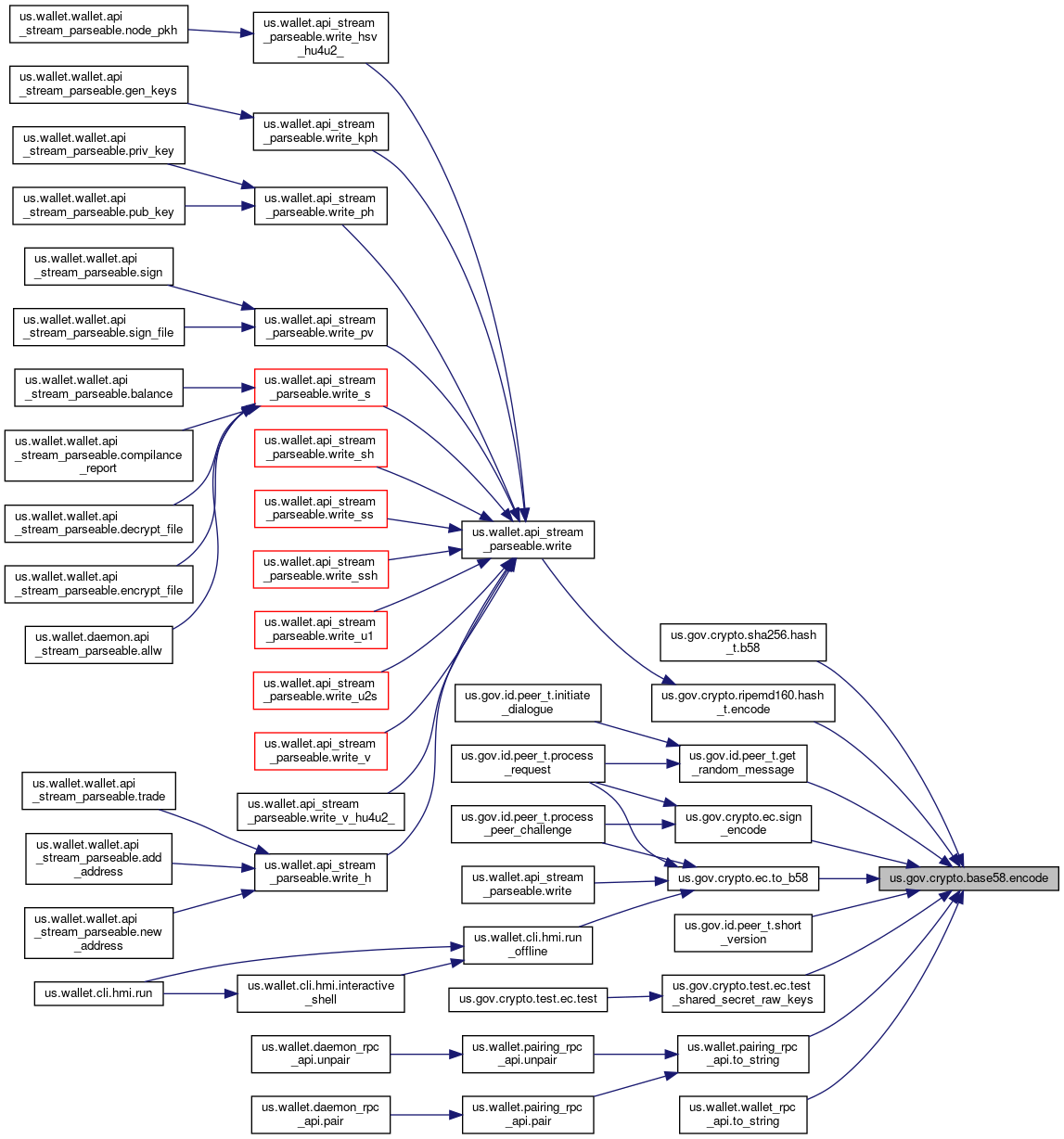
Member Data Documentation
◆ ALPHABET [1/2]
|
static |
Referenced by us.gov.crypto.base58.base58(), and us.gov.crypto.base58.encode().
◆ ALPHABET [2/2]
|
static |
◆ ENCODED_ZERO [1/2]
|
staticprivate |
Referenced by us.gov.crypto.base58.encode().
◆ ENCODED_ZERO [2/2]
|
staticprivate |
◆ INDEXES [1/2]
|
staticprivate |
Referenced by us.gov.crypto.base58.base58(), and us.gov.crypto.base58.decode().
◆ INDEXES [2/2]
|
staticprivate |
The documentation for this class was generated from the following files:
- sdk/wallet/cs/us/gov/crypto/base58.cs
- sdk/wallet/java/us/gov/crypto/base58.java
